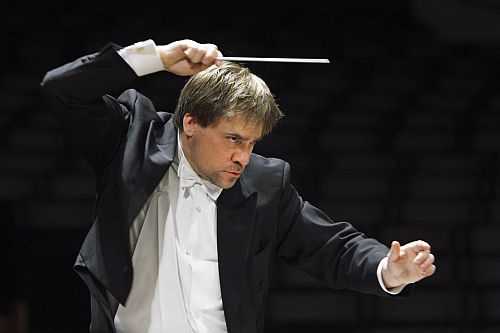 United Kingdom Nielsen, Mahler, Nielsen: Roderick Williams (baritone), BBC Philharmonic Orchestra/John Storgårds (conductor), Bridgewater Hall, Manchester, 9.5.2015 (MC)
United Kingdom Nielsen, Mahler, Nielsen: Roderick Williams (baritone), BBC Philharmonic Orchestra/John Storgårds (conductor), Bridgewater Hall, Manchester, 9.5.2015 (MC)

Nielsen: Symphony No. 1
Mahler: Songs from ‘Des Knaben Wunderhorn’
Nielsen: Symphony No. 4 ‘Inextinguishable’
The standing of John Storgårds, the principal guest conductor of the BBC Philharmonic, goes from strength to strength. As this season comes to a close Storgårds can look back on a number of highly successful guest engagements. I can recall reporting from stunning performances of the Shostakovich Fourth Symphony and the Vaughan Williams Sixth Symphony that resonate long in the memory.
The 150th anniversary year of Carl Nielsen’s birth saw Storgårds and the BBC Philharmonic embark on the first of three concerts in ten days of the Danish composer’s cycle of six symphonies. Storgårds and his players have already released a recording of the Nielsen set on the Chandos label.
A product of the composer’s late twenties and a rare visitor to concert programmes Nielsen’s First Symphony is such an intensely melodic work built firmly on characteristically bold harmonic invention and steely rhythms. Eminently resolute throughout Storgårds drove the work excitingly hard in a reading high on vitality, weight and unyielding in purpose. Although a symphony that can endure robust treatment and certainly not about resplendency of playing I did feel Storgårds was pushing the envelope rather too wildly, especially in the Scherzo revealing some rough edges at the expense of overall unity. Not for the last time during the evening the horns played uncomfortably loud. A stark contrast was the Andante a continuous stream of lyricism that felt like a paean to Spring together with a passionate intensity of an amorous quality maybe depiction of a romantic encounter.
Next Storgårds turned his attention from Nielsen to Mahler’s ‘Wunderhorn’ settings. Both composers were close contemporaries yet sandwiching their music together came across strongly as a curious combination of clashing styles that caused some fuss on social media between audiences both in the hall and hearing the live broadcast. Several comments referred to the ‘Wunderhorn’ settings as a “distraction” from the Nielsen programme. Clearly not in the same elevated league as his ‘Rückert-Lieder’ there is no doubt that Mahler was greatly enthused by the ‘Des Knaben Wunderhorn’ (‘The Youth’s Magic Horn’), the anthology of traditional German folk poems that Achim von Arnim and Clemens Brentano had assiduously collected. Over this three concert series Storgårds is presenting all twelve of the ‘Wunderhorn’ settings that Mahler orchestrated. Surprising too was the number of people on social media that had difficulty with the lack of depth and general banality of the folk-inspired text. (What a relief, I thought it was just me!) Renowned baritone Roderick Williams, a regular visitor to the Bridgwater Hall, was tasked with singing a quartet of ‘Wunderhorn’ settings and excelled with the tenderness of the opening song ‘Wo die schönen Trompeten blasen’ (‘Where the Fair Trumpets Sound’), the finest of tonight’s settings by some distance. All evening Williams was in fine voice, as clear and as expressive as we have come to expect and extremely comfortably across his range. I did feel some sympathy for Williams having to interpret the twee and prosaic text of the second setting ‘Verlor’ne Müh’ (‘Wasted Effort’) and the indignity of being swamped several times by the sheer weight of lush orchestral sound Storgårds extravagantly demanded.
Awesome in its impact was the key work of the evening, Nielsen’s heavyweight Fourth Symphony known as the ‘Inextinguishable’. From the mid-ninetieth century Nielsen’s native Demark had adopted a position of neutrality maintaining its non aggressive stance during the First World War. But Nielsen was certainly not immune to the horrors of the World War that was raging close to Denmark’s borders. Despite the scepticism Storgårds had expressed in a pre-performance interview it’s hard to see the Fourth Symphony as being anything other than a ‘War’ Symphony. At the heart of the symphony is the manifesto of life-force being indomitable and inextinguishable. It’s a much admired work with a recent BBC Radio 3 trail going as far as describing the work as “life affirming”.
Bold and incisive as ever Storgårds launched into the work with a ferocious energy constructing a performance of structural integrity and thrilling playing that penetrated right to the core of the work. The crucial elements of dynamic flow and continual movement were compellingly conveyed. My highlight was the emotional intensity created in the slow third movement with the searing strings accompanied by pulsating timpani strokes. In the Finale the amount of energy and drama generated by the irrepressible Storgårds was remarkable especially the powerful E-major ending. As well as the aural experience the two brutally combative sets of spatially separated timpani provided a visual element to the performance.
In Nielsen’s music of great struggle and regeneration this triumphant reading by John Storgårds was a quite overwhelming experience.
The concert was introduced by Stephen Johnson, broadcast live on BBC Radio 3. and is available on BBC i-player.
Michael Cookson